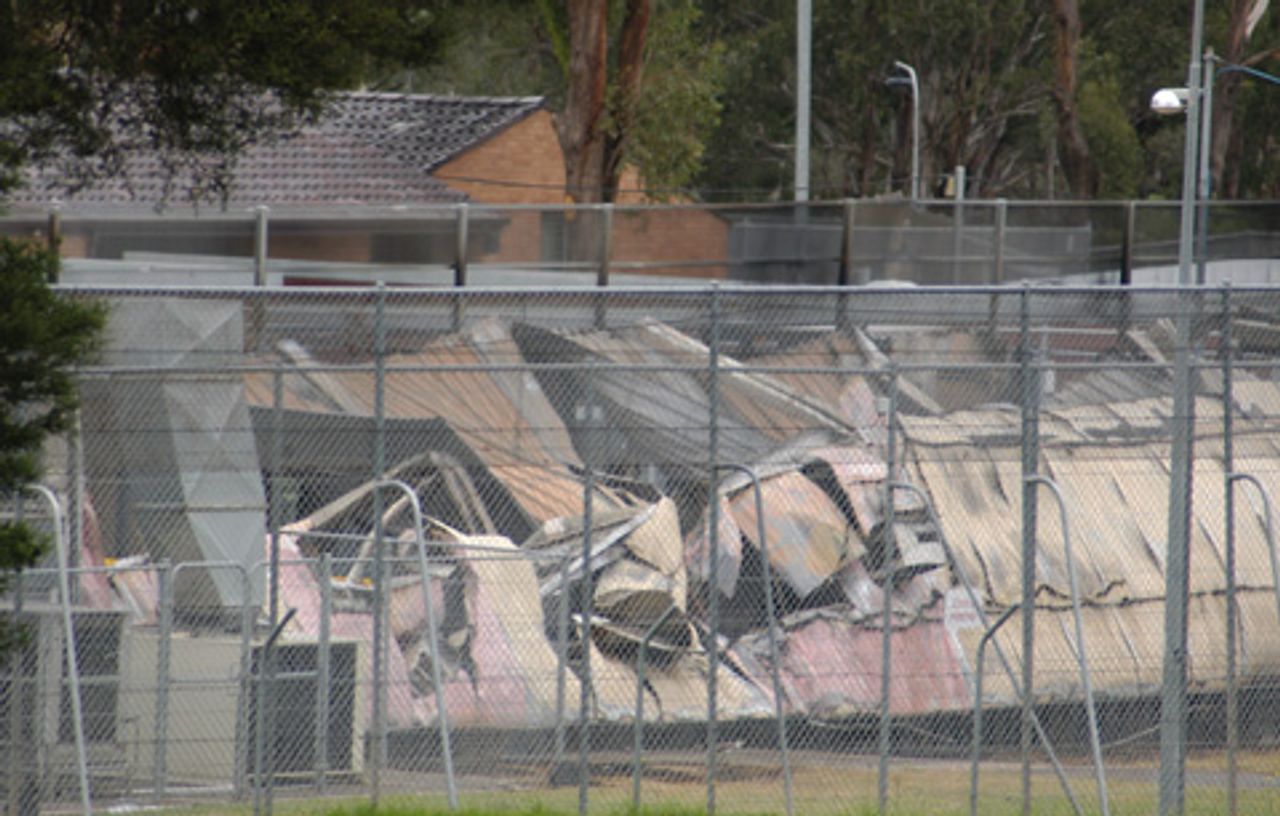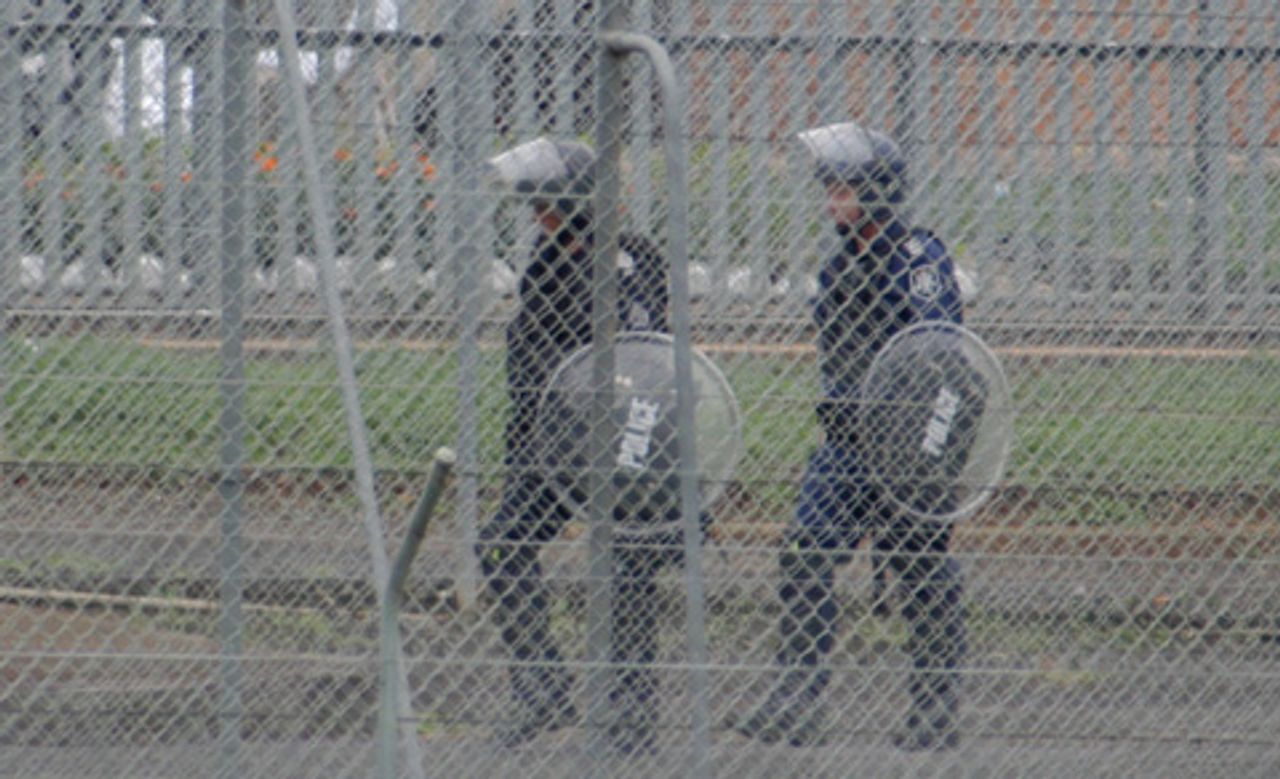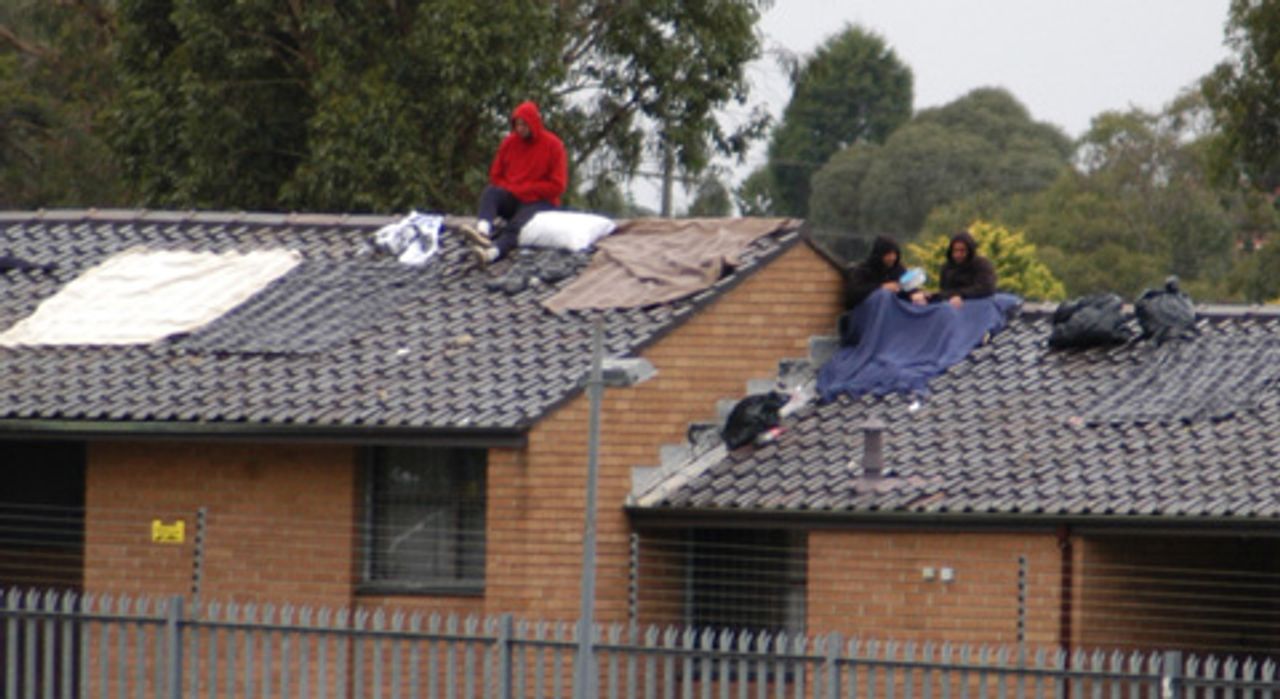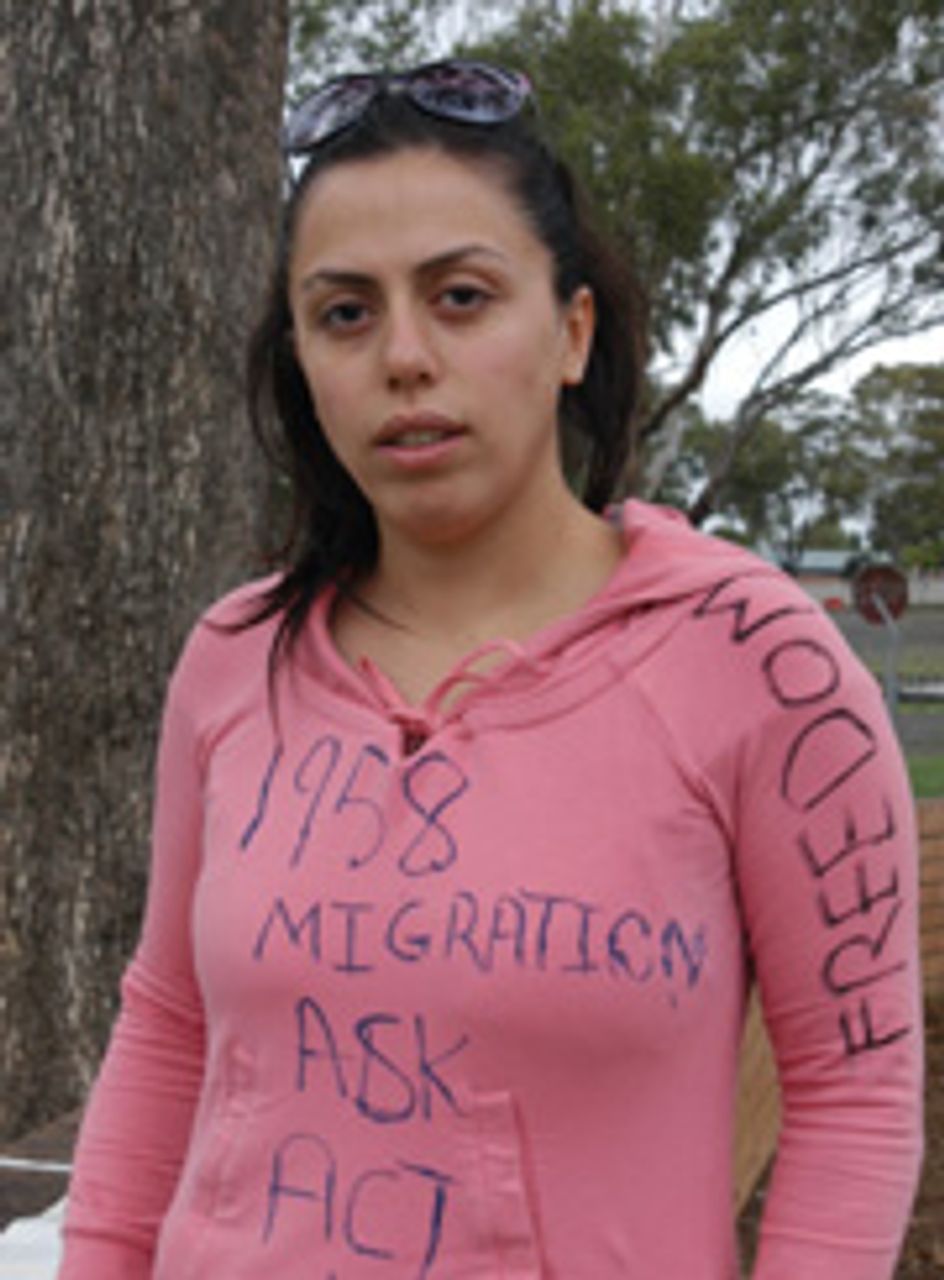The Australian Labor government’s repressive “border protection” and mandatory detention regime has produced another angry protest by detainees, this time at the Villawood Immigration Detention Centre, in Sydney’s western suburbs.
Two Kurdish asylum seekers—Amir Morad Masoor, 22, and Mahdi Darabi, 24—began a roof-top protest at Villawood on April 20 after the appeal stage of their determination process was rejected. Both men had been in the detention centre for 15 months. They were joined later that day by 11 other asylum seekers, who had been in detention for more than a year, with one reportedly held for more than 24 months. Most of the protestors had exhausted their final appeals to the Department of Immigration and Citizenship and were unsure of their fate.
Tensions among detainees escalated during the day and then erupted into angry protests. According to unconfirmed reports, an estimated 100 asylum seekers began rioting. Nine buildings, including a computer room, kitchen and medical centre, were burnt to the ground. No one was injured as fires burned into the early hours on April 21.
 Remains of burnt Villawood buildings
Remains of burnt Villawood buildingsOne of the protestors, Iranian Majid Parhizkar, later told the media that the asylum seekers were desperate. “We just want attention,” he said. “We did not hurt firemen. We did not attack security. I’m not an animal, I’m human.”
As of today, three men are continuing the rooftop demonstration, displaying banners such as “We need help” and “We are human not criminal”, and demanding the right to speak to a UN representative.
Protests involving over 200 refugees have also erupted at the Curtin immigration detention centre in Western Australia’s remote north-west. According to refugee advocates, an estimated 100 Curtin detainees are currently involved in a hunger strike. Another refugee at Christmas Island has sewn his lips together in protest over conditions at the over-crowded facility.
The Villawood riot marks the second such incident in Australian immigration detention centres in less than six weeks. In March, asylum seekers at Christmas Island demonstrated over squalid living conditions and long processing times. The Labor government responded to that protest by mobilising hundreds of Australian Federal Police (AFP), which used tear gas, flash-bang grenades and bean-bag bullets against asylum seekers. (See: “Australia: Ongoing repression produced asylum seeker protests”).
As was the case following the Christmas Island protests, the Gillard government has reacted to the Villawood protests with intimidation and repression. Immigration Minister Chris Bowen immediately declared that those involved in the Villawood protests would be punished “with the full force of the law.” He threatened to reject their visa applications on “character grounds” under section 501 of the Migration act.
“These are people who are not happy that they have not been accepted as refugees,” Bowen declared. “If they think they will change their visa outcome, if they think they will be accepted as refugees because of this sort of protest action, they’ve chosen the wrong government and the wrong minister, because that won’t be happening.”
On April 21, AFP and New South Wales police officers took control of the facility, which is managed by Serco private security service, and banned all visits. Social Justice Network spokesman Jamal Daoud told the World Socialist Web Site that he had been arrested and physically removed from the centre by police and fined $350 fine for trespass after he attempted to gain access to the detainees.
On early Friday morning, AFP officers in full riot gear stormed a room in the facility where refugees had been moved to safety from the still smouldering fires. Many were still undressed and asleep when police ordered them to leave the facility, manhandling those who did not immediately comply.
 AFP officers in riot gear inside Villawood
AFP officers in riot gear inside VillawoodAsylum seekers were forced to sit outside on the ground for more than 90 minutes, with some ordered to lie down on their stomachs. Twenty-two detainees were then removed to the maximum security Silverwater jail, where they are still being held without charge. Police claim they are being detained for questioning.
Protests by refugee support groups and the New South Wales Council of Civil Liberties over incarceration of the men in Silverwater have been brushed aside by the Department of Immigration, which claims it can designate any facility an “alternative place of detention” under the Migration Act.
 Rooftop protestors
Rooftop protestorsImmigration authorities and federal police are now attempting to starve the three remaining Villawood rooftop protestors into submission. Acting Prime Minister Wayne Swan yesterday defended these measures, declaring that “the authorities should take every responsible course of action to remove” the rooftop protestors. Like his immigration minister, Swan threatened that all those involved in the Villawood protest would “feel the full force of the law.”
Elected to power in late 2007 claiming it would introduce a “more humane” immigration policy, the Labor government is now incarcerating more than 6,500 people in detention, compared to only 500 when it took office. Prime Minister Julia Gillard claimed last October that children would be released from detention but the numbers continue to rise. More than 1,000 children are now being held, 500 of which are either orphans or unaccompanied minors.
The mandatory detention system is clearly driving asylum seekers to breaking point—five asylum seekers have committed suicide since September, including three at Villawood. Now the media, with the backing of the opposition parties, is pressing the Labor government for even tougher and more punitive measures.
One proposal was made by Paul Kelly, the Australian newspaper’s editor-at-large, in an April 23 comment titled “Refugee riot highlights a dilemma.” He declared that the Villawood events “pose a significant test” for the Labor government and called for amendments to the “character test” of the Migration Act’s section 501, to make it easier for the minister to reject asylum seekers.
Under current legislation, the “character test” can only be applied to asylum seekers if they have been found guilty of an offence that carries a jail term of more than 12 months. “[Bowen] may need to seek a quick review of the relevant provisions of the act, explain its shortcomings to the public and, if required, propose tougher amendments to the law,” Kelly wrote.
The Labor government will no doubt respond to Kelly’s call to implement further punitive measures.
The minority Labor government can count on parliamentary support from the Greens. While Greens feign concern over the plight of the refugees and posture as critics of Labor’s immigration policies, the organisation has pledged to ensure Labor remains in office.
Asked whether the Greens would consider withdrawing their support for the government over Labor’s treatment of refugees, Greens MP Adam Bandt gave a categorical “No” on Channel Ten’s “Meet the Press”. “We’ll keep using our space in parliament to push for action on the broader suite of refugee policies and move towards a more human solution,” he said.
While appealing for humanitarian window-dressing, the Greens, like Labor and the Coalition, fully back the policy of so-called border protection and forced repatriation of asylum seekers. Far from being treated like criminals and made political scapegoats for the failure of successive governments to provide decent jobs and public services, these refugees, who have risked their lives to flee oppression and persecution, should be immediately freed and granted full citizenship rights.
* * *
 Melina Adlparvar
Melina AdlparvarMelina Adlparvar, a refugee who has gained permanent residence in Australia, spoke to the WSWS outside the Villawood detention centre on April 23. Hussan Alsaegh, her husband, was in detention for three months in Christmas Island and then transferred to the Villawood facility, where he has been held for just under a year. The two initially met in Iran but separated and moved to Australia independently. Adlparvar discovered her husband was in Villawood late last year.
“Less than a month ago he received a rejection for the third time on his application,” she said. “After that, he wanted to kill himself. ‘I can’t believe it,’ he would tell me. ‘Why do I have to stay here?’”
Adlparvar described the lengthy appeal processes: “They told us that if we want to apply through the Federal Court or the High Court we will be put on a waiting list and have to wait for at least six months. If he is rejected there, we have to apply to the immigration minister, which will take another six months.”
She explained the effect that the situation had had on her own life. “I’m studying at TAFE two days per week, but I simply do not have the energy to go there anymore, and my mind is not working. My psychologist has told me that I need to stay at home and rest because I have developed deep depression over my husband’s situation. I do not have enough money to buy food, and I need to bring food to my husband because the food they offer there is unhealthy and he finds it unbearable.”
Adlparvar has also been in contact with Majid Parhizkar, one of the three demonstrators still involved in the rooftop protest. She said there had been a marked deterioration in his mental condition.
“He has been in detention for 20 months,” she said. “Less than a month ago, his final appeal for residence was rejected. He was sitting alone, smoking and crying that day. I tried speaking to him but he would not respond to anything I said. I tried to get him to speak to me and to cheer up, but he threatened to kill himself.”
“It is not just him or my husband. There are doctors and engineers being held in there. Neither they nor those without qualifications deserve to be treated like animals.”
